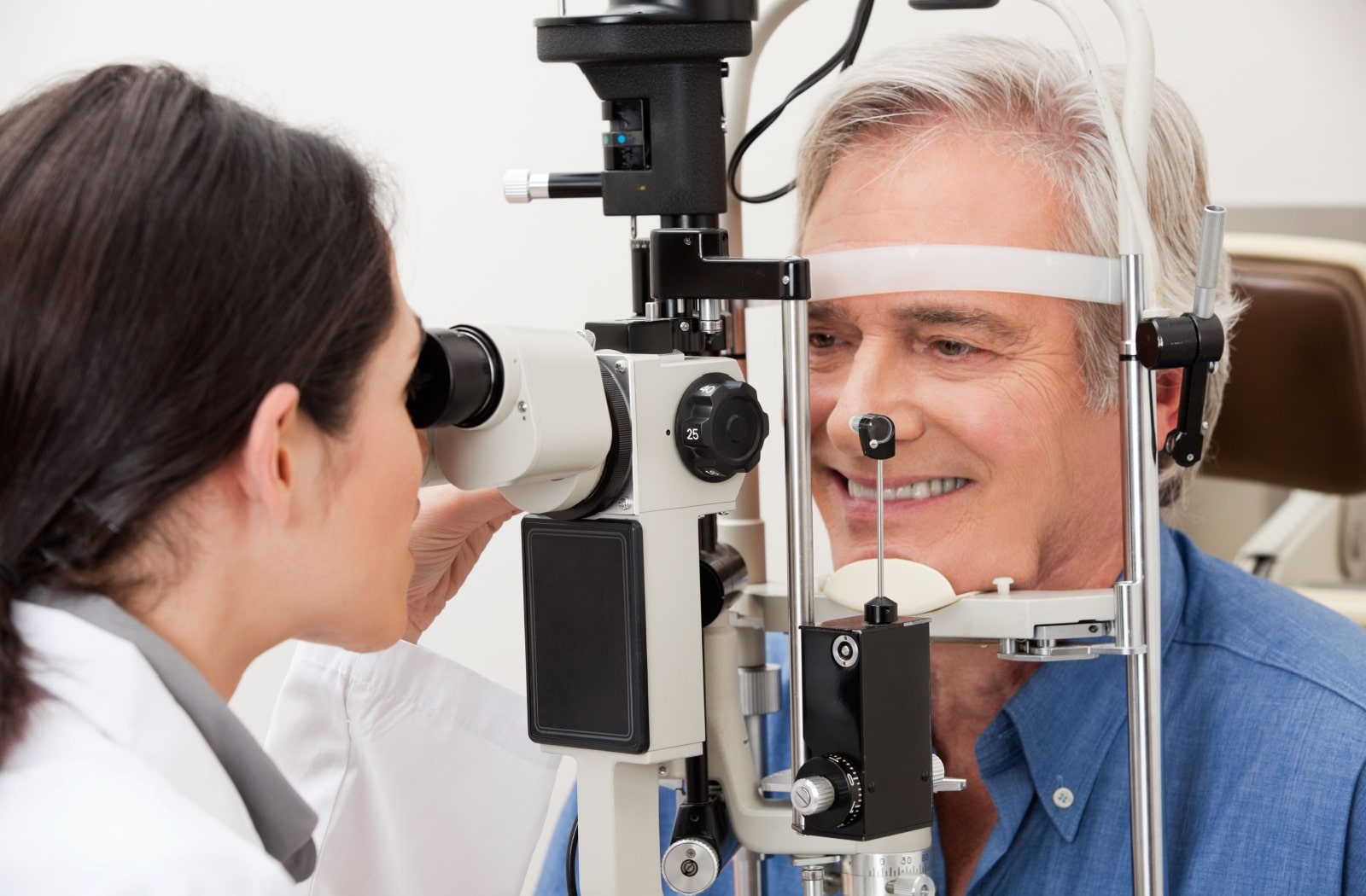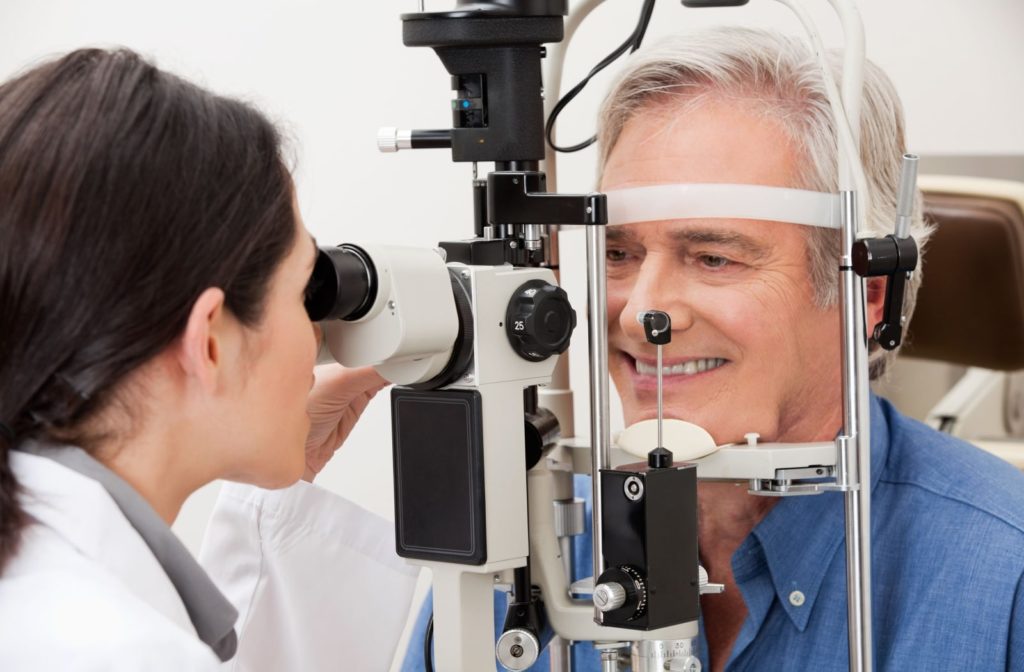Diabetes can have a significant impact on various parts of your body, including your eyes. People with diabetes need regular eye exams to detect complications early and manage them effectively.
A diabetic eye exam is a special eye check-up for people with diabetes. It helps to find and treat eye problems caused by diabetes before these problems can get worse. The exam consists of the doctor looking at the back of your eyes, measuring your vision, and checking for signs of damage. It’s important to have this exam regularly to protect your eyesight.
Understanding Diabetic Eye Exams
A diabetic eye exam is a thorough and specialized examination aimed at identifying and monitoring eye issues that can arise due to diabetes. Diabetes can cause various serious eye conditions, including diabetic retinopathy, diabetic macular edema, cataracts, as well as glaucoma.
These conditions develop when high blood sugar levels cause damage to the eyes, often affecting blood vessels in the retina. If such complications are not detected—and treated—in their early stages, they can lead to significant vision, or even blindness. Regular diabetic eye exams are therefore crucial for maintaining eye health and preventing severe outcomes.
Importance of Regular Eye Exams for Diabetics
Diabetic eye disease often presents no symptoms in its early stages. By the time you notice changes in your vision, the damage may already be significant. Regular diabetic eye exams allow for early detection and intervention, which can prevent severe complications and preserve your vision.
Key Benefits of Regular Exams:
- Early Detection: Identifies eye issues before symptoms appear.
- Prevention: Helps prevent progression of diabetic eye diseases.
- Treatment: Allows timely treatment to avoid further damage.
What to Expect During a Diabetic Eye Exam
A diabetic eye exam is more comprehensive than a standard eye exam. It typically includes several specialized tests that thoroughly assess the health of your eyes and detect any diabetes-related changes.
Steps Involved in the Exam:
Medical History Review: Your eye doctor will review your medical history, including your diabetes management plan and any previous eye issues you’ve had.
Visual Acuity Test: This test measures how well you see at different distances, helping to determine any vision changes.
Dilated Eye Exam: Your doctor will use special drops to dilate your pupils. This allows for a better view of the back of your eye (retina) and helps in spotting any signs of diabetic retinopathy or other issues.
Digital Retinal Imaging: Advanced imaging techniques, such as optical coherence tomography (OCT), capture detailed images of your retina. These images help with detecting swelling, bleeding, or abnormal growth.
Intraocular Pressure Measurement: This test measures the pressure inside your eyes. High intraocular pressure can be a sign of glaucoma, which is more common in people with diabetes.
How Often Should You Get a Diabetic Eye Exam?
The frequency of diabetic eye exams varies based on several factors, including the type of diabetes you have, how well your blood sugar levels are managed, and whether you already have any existing eye conditions. Regular eye exams are essential to catch potential issues early and prevent serious complications. Here’s a more detailed look at the recommended frequency of exams for different groups of people with diabetes:
- Type 1 Diabetes: Individuals with Type 1 diabetes should have an eye exam within five years of their diagnosis. Following this initial exam, one should schedule annual eye exams to monitor any changes in health and address potential problems as early as possible.
- Type 2 Diabetes: For those with Type 2 diabetes, an eye exam is recommended at the time of diagnosis, as eye complications can already be present. After this initial exam, it is crucial to have yearly eye exams to keep track of any developments in the health of the eye and ensure timely treatment if needed.
- Pregnant Women with Diabetes: Pregnancy can exacerbate eye problems associated with diabetes, making it vital for pregnant women to have an eye exam before conception if possible. Additionally, this group should undergo an eye exam during the first trimester and continue to have exams as recommended by their healthcare provider throughout the pregnancy. Doing so helps manage any pregnancy-related changes to vision and ensures both maternal and fetal health.
Protect Your Vision: The Importance of Diabetic Eye Exams
Regular diabetic eye exams protect your eye health and help prevent severe vision loss or blindness by detecting diabetes-related eye conditions as early as possible. By understanding the importance and procedures involved in these exams, you can take proactive steps to protect your vision. If you have diabetes, schedule your diabetic eye exam today and ensure that your eyes remain healthy and your vision sharp.
For more information on managing diabetes and eye health, consult your healthcare provider or visit reputable diabetes and eye health organizations online.Experience exceptional eye care at Henderson Vision Centre. Our dedicated team is ready to provide you with personalized, top-quality optometric services. Don’t wait—schedule your appointment today and see the difference expert care can make!



